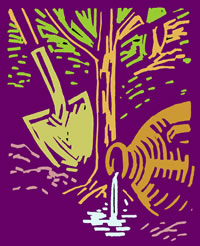
3rd Sunday of Lent Year C
As we settle into our Lenten journey, the first two reading of today’s liturgy remind us of our destination. And the gospel reading brings us the advice of Jesus to be alert, ready to enjoy the blessings that can be ours at the end of the journey.
The reading from Exodus is one of the most significant texts of the Old Testament – a graphic summary, in fact, of old Israel’s faith. That faith derived its definitive shape under the leadership of Moses; in the name of God, he led the people out of slavery; as a prophet called by God, he made them aware that this deliverance was the work of the living God, revealed to them as the champion of the oppressed – in stark contrast to the gods of other peoples, venerated as the patrons of oppressive regimes. This break- through revelation is summed up in the divine name, Yahweh (‘I AM WHO I AM’). The divine being affirmed in this name is an active-being-present (‘I will be with you; I will express all that I am in what I shall do for you’). The call of Moses takes place at the Mountain of Horeb (another name for Sinai), where God’s covenant with the liberated people will be solemnised – calling them to bring to the whole world the good news of God’s generous and merciful ways.
Thirteen centuries later, standing in the fullness of light brought by the Paschal Mystery, Paul writes to the Corinthians, confidently interpreting the Exodus and Covenant of old Israel as a foreshadowing – or type – of the final liberation of humanity in the Risen Lord. And he initiates a Christian tradition that finds this foreshadowing in the details of the Old Testament story: passing through the sea to freedom – a foreshadowing of Baptism; the miraculous food and drink provided in the wilderness – a foreshadowing of the Eucharist; the rock providing miraculous water – a symbol of Christ. This dramatic interpretation Paul uses, however, as the lead-up to an admonition: those whom God liberated in the first Exodus ‘failed to please God and their corpses littered the desert’. Their fate is a ‘warning’ to the Corinthian community – torn apart by disputes.
Paul’s admonition serves as an introduction to the down to earth advice the Lord himself has for us in the gospel reading. News of catastrophes leads thoughtful people to reflect upon the meaning of life. Jesus warns against the common temptation to interpret the designs of God in such events. They should be a reminder to put our lives in order: ‘Unless you repent you will all perish’.
Another Lent! How many Lenten journeys have we made – and with what profit to show? How many Lents will we see in the future? Luke - sensitive to the fullness of the Good News brought by the Saviour – links Jesus’ call to conversion with the parable of the barren fig tree. As we ponder Lent’s call to a more generous Christian commitment, we do so in the presence of the compassionate and patient God revealed to us in Jesus Christ: ‘Leave it; it may bear fruit’.
John Thornhill sm

